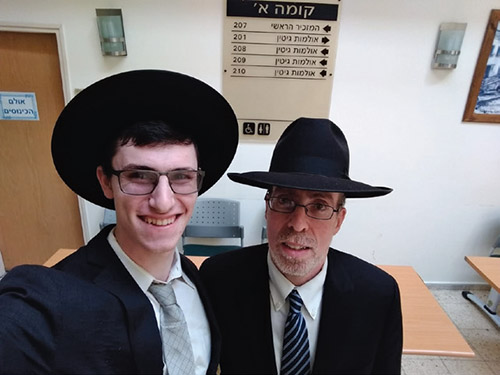
It was an idyllic five days I spent during yeshiva week in Israel with my son Binyamin. Learning with Binyamin, who is spending his second year of learning at Yeshivat Shaalvim, was heavenly. It was especially gratifying to join the shiur of Binyamin’s rebbe at Shaalvim, Rav Yehuda Turetsky, who was my Talmid at TABC from 1999-2001. It was a double nachat experience—from my actual son Binyamin and from my “metaphorical son” (the Torah regards a talmid as one’s metaphorical son, see Rashi to Devarim 6:7) Rav Yehuda. In addition, Binyamin worked hard to carefully plan out the visit to allow us plenty of time to learn together and to also reconnect me with so much family and old friends who have made the very wise choice to move to Israel.
One of the activities was visiting the Tel Aviv beit din and watch Rav Tzvi Ben Yaakov administer gittin. As an Israeli Rabbanut-recognized mesadeir get (get administrator), I have been working with Rav Ben Yaakov for many years dealing with very challenging situations. It was an honor and a pleasant experience to finally connect with him in person.
The meeting did not disappoint. Since the last time I had visited Tel Aviv in 1992, the beit din had been completely overhauled. It is now a clean, very efficient and technology-driven system. Rav Ben Yaakov nimbly managed eight different gittin he handled the morning we met from his state-of-the-art computer. The gittin were handled swiftly and efficiently. Rav Ben Yaakov and his able staff also competently managed the culture gaps between the beit din members and the predominantly non-observant Tel Aviv constituency.
My son Binyamin and I managed all during this time to pose to Rav Ben Yaakov more than a dozen questions about fine points regarding gittin. We found it interesting that Rav Ben Yaakov administers gittin without an additional two dayanim. This is in accordance with the practice of Rav Moshe Feinstein and Rav Yosef Eliyahu Henkin, which is followed by most rabbanim in the United States. However, in Israel it is more typical to follow the Noda B’Yehuda’s requirement for the presence of a beit din at a get. Rav Ben Yaakov resolved some of my lingering questions, such as how to administer a get for Yemenite Jews. Rav Ben Yaakov replied that the common practice, even amongst Yemenite dayanim, is to administer a Sephardic get in such circumstance and not to retrace the practice of batei din in Yemen.
As interesting as this magnificent interaction was, perhaps the most eye-opening experience of our day took place during our cab ride from the Tel Aviv train station to the beit din. My son and I regard ourselves as Modern Orthodox Bnei Torah (or “Modern Orthodox machmir,” if you wish) and do not usually wear a black hat. However, out of respect for Rav Ben Yaakov and his staff we donned black hats for the day. As father and son entered the cab across from the Tel Aviv train station, the manager offered to seat a fashionably dressed woman in the front seat in the car while father and son rode in the back.
However, as soon as the woman saw our black suits and black hats, not a common site in Tel Aviv, she refused to enter the car. Apparently it was beneath this woman’s dignity to ride in the same taxi with two “chareidim.”
If only this woman would know. My son and I are ardent Religious Zionists! We both religiously and zealously join the NORPAC Mission to Washington each year to lobby on behalf of Medinat Yisrael. We both passionately recite Hallel on Yom Ha’atzmaut. Binyamin intends to make aliyah and work in the burgeoning Israeli technology sector. Indeed, lurking beneath our black hats that day were our kippot serugot! What a stunning example of sinat chinam (unnecessary hatred)!
This sad interaction pointedly teaches the importance of not judging a book by its cover. Moreover, my son and I felt the brunt of anti-chareidi bigotry on our day dressed as chareidim and it was distasteful. I hope readers of our column will vicariously experience this terrible feeling of being shunned and resolve to love each and every Jew. Hillel (Shabbat 31a) taught that Judaism may be distilled to one principle: That which is hateful to you, do not do to others. Great love must be extended to chareidim along with every Jew, even if they dress differently than us.
Whatever quibbles and differences there exist between the sectors of our people, ahavat Yisrael must prevail. Our enemies rejoice at our divisions and exploit it to the maximum. One can only imagine the pain and disappointment when Hashem sees frivolous hatred flaring amongst His children.
Ultimately, the geulah, the redemption of am Yisrael, will occur only when we cure the sins of our past. Rav Kook famously taught that just as sinat chinam destroyed the Second Beit Hamikdash, the third Beit Hamikdash will be built on a foundation of ahavat chinam. We can turn the ugly experience my son and I endured at the taxi station in Tel Aviv by resolving and placing into action an attitude of great love for each and every Jew, even those, nay especially those, with whom we do not see eye to eye on every issue.
By Rabbi Haim Jachter
Rabbi Haim Jachter is the spiritual leader of Congregation Shaarei Orah, the Sephardic Congregation of Teaneck. He also serves as a rebbe at Torah Academy of Bergen County and a dayan on the Beth Din of Elizabeth.













